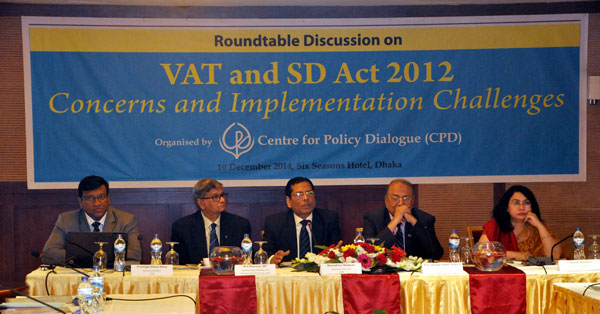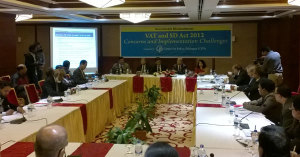The new Value Added Tax and Supplementary Duty Act 2012 must be informed by equity concerns, institutional capacity strengthening and its implementation should benefit the government and ensure tax justice for entrepreneurs and consumers.
In addition to revenue generation for public expenditure, the new taxation reform agenda should safeguard the welfare of certain sectors with a view to supporting investment, growth and employment, and promoting social equity and economic justice by expanding the social safety net programmes.

The observation emerged from the roundtable discussion on “VAT and SD Act 2012: Concerns and Implementation Challenges” held on 10 December 2014 at Six Season hotel. Mr Towfiqul Islam Khan, Research Fellow, CPD presented the issue paper, co-authored by Senior Research Associate Mr Zafar Sadique, which identified salient concerns on the new act for discussion.
Chief Guest Mr M A Mannan, MP, Hon’ble State Minister for Finance and Planning acknowleged that the new VAT act is more transperant than the previous one but he urged to simplify the rules and make it more comprehensive for people. Although this huge budget requires best practices for VAT and tax collection, VAT rates should be reduced for daily consumed food items and exempted of services such as healthcare and education, he added.
Special Guest Mr Kazi Akram Uddin Ahmed, President, FBCCI said that the entrepreneurs want to pay VAT and tax but are in need of an easy system. The taxpayers are low in numbers and they take all the burden, so the reforms should be intended in a business-friendly manner.
The VAT and SD Act 2012 aimed to modernise the cumbersome process of VAT collection, noted Barrister Jahangir Hossain, Member (VAT Policy), National Board of Revenue.
Chair of the session, Professor Mustafizur Rahman, Executive Director, CPD said that entrepreneurs are willing to pay tax and VAT because infrastructure development cannot take place without revenue collection, which in turn results in increased cost of doing business and hampers entrepreneurs. He stressed ICT uses, training and automation in revenue collection and noted that without institutional capacity building successful implementation of new reforms will remain doubtful.

Dr Zahid Hussain, Lead Economist, World Bank, favoured increasing revenue-GDP ratio to retain recurrent public expenditure and the proposal of a Single VAT rate at 15 percent. He said that it was not very unusual given the average rate at 15-20 percent in the world and considering rates such as 27 percent in Hungary, 12 in Philippines, 6-20 in China, 7 in Thailand, 4 percent in Andora.
Dr A B Mirza Azizul Islam, Former Advisor to the Caretaker Government, Ministries of Finance and Planning laid emphasis on expanding the tax net and reducing VAT rate from 15 percent to 10 percent as in most countries.
Ms Ferdaus Ara Begum, CEO, BUILD Project, Dhaka Chamber of Commerce and Industry (DCCI) pointed out that according to the new VAT act, untimely VAT pay must be accompanied with 2 percent interest which is not much of an opportunity. She also noted that single VAT rate at 15 percent is high against rates such as 5-8 percent in Japan, 6-12 percent in Belgium, 6-12.5 percent in Sweden etc.
Dr Ahsan Habib Mansur, Executive Director, Policy Research Institute of Bangladesh and Former Division Chief, International Monetary Fund (IMF) said successful role of revenue collection mechanism is crucial to elevate the country to middle-income status.
Mr Md Aminur Rahman, Former Member, Income Tax Policy, National Board of Revenue (NBR) said that accountability problem persists in the VAT collection system. According to the Institute of Chartered Accountants, only 15,000 out of 1,20,000 companies in Bangladesh have records on their paid VAT amount, he noted, urging more efficient account management and Electronic Cash Register (ECR) to overcome such challenges.
Regarding effect of VAT collection on Small and Medium Enterprises (SMEs), Mr Ali Zaman, President, SME Ownership Association noted that truncation and tariff value should be abolished for SME and real value addition should be in place to collect VAT. He added that the mechanism of 4 percent VAT collection is difficult because it is repeatedly collected every time a good changes hands. Although sales tax has been abolished, SME entrepreneurs pay VAT for imported raw materials because they cannot directly import.
Md. Ahsanul Karim, Coordinator- Tax Justice Network, EquityBD laid emphasis on direct tax collection rather than VAT because according to him the direct and indirect tax ratio has remained almost constant.
Mr M S Siddiqui, CEO, Bangla Chemical, said that VAT collection and exemption remains at the sole discretion of the VAT officer which keeps potential options open for bribery and corruption. He also added that honest entrepreneurs are supposed to lose business competitiveness against VAT-evasive entrepreneurs.
Mr Alison Subrata Baroi, Director, Shushashoner Jonny Procharavizan (SUPRO) alleged why consumers are not in the consultation process of VAT and taxation laws while everyone is paying vat and tax. According to a SUPRO survey report, consumers do not have sufficient understanding of the processes of VAT, tax, he noted.
Dr Muhammad Abdul Mazid, Former Chairman, NBR; Mr Shahabuddin, Consultant, VAT and Customs and Ex-member, NBR; Md. Ahsanul Karim, Coordinator- Tax Justice Network, EquityBD also addressed the discussion among others.

